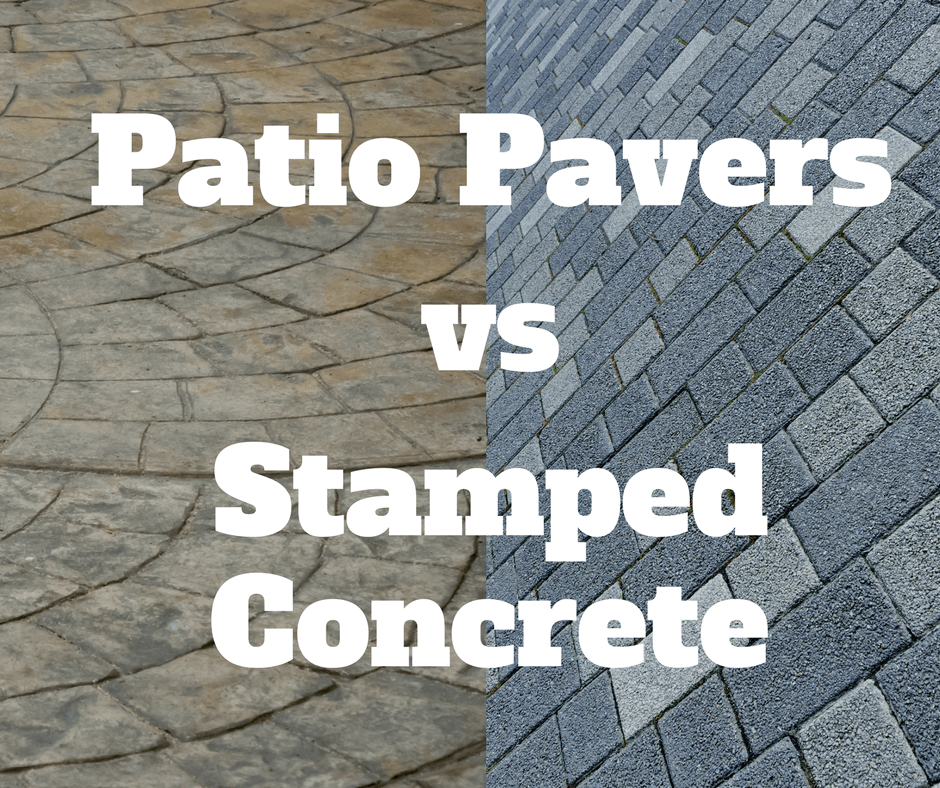When it comes to installing a new custom patio, you’ve got options. Arguably the most significant decision you’ll have to make about your patio installation is the surface material.
Right now, there’s a debate raging over which is better: patio pavers or stamped concrete. Either can be used to create a beautiful finish for your patio and beyond. Budget is definitely a consideration in every hardscaping decision, but for this particular question, where you live could be the deciding factor.
Concrete-Cracking Conditions
It’s well documented that the big drawback of any concrete slab is the risk of cracking. While the possibility is always present, there are two environmental conditions that make cracks in your concrete far more likely to develop – temperature and tremors. In Northern Virginia, where we’re located, we have four seasons, and the ground freezes during most winters. The freeze-thaw cycle causes outdoor elements to expand and contract, and that action does a number on concrete. If you live in a temperate climate where the ground is likely to freeze, the cost you’ll incur to maintain a concrete pad is likely to be high. If your home is in the South, however, your patio will be more likely to stay intact. The second big threat comes into play if you live near a fault line. Nothing shakes up concrete like an earthquake, and a small tremor can do big damage. As you plan your patio, be sure to take these two factors into account.
Pros and Cons of Patio Pavers
Perks
- Easy to install
- Low-maintenance
- Versatile
- Endless design options
- No wait time for curing
- Easy to replace
- Skid-resistant
- Can be made permeable to eliminate water runoff
- Durability
- Manufacturer Guarantee
- Impervious to Freeze/Thaw
- Can be replaced individually
- Won’t Crack
- Can be mixed and matched
- Add long-term value to your home
Drawbacks
- Higher Up-Front Cost
- Risk of shifting over time
- Joints may need to be topped off every few years
- Weeds can grow between pavers
Pros and Cons of Stamped Concrete
Perks
- Widely Customizable
- Can be very ornate
- Sealant Prevents Damage
- Easy to Install
- Lower Up-Front Cost
- Can imitate natural stone
Drawbacks
- 3-4 Day Curing Period
- No Manufacturer Warranty
- Cracks when the Ground Shifts
- Vulnerable to Freeze/Thaw
- Requires Expansion/Control Joints or Saw Cuts
- Deteriorated by De-Icing Salts
- Color fades over time
- Recurring Sealing Cost (every year or few years)
- Patching Threatens Color Consistency
- Cost of Repair
- Eventual Need for Replacement
Balancing the Budget
It’s generally true that the up-front cost of pavers is more expensive, but these two options are closer in price than many people believe. Just how much you’ll spend on pavers depends on the brand and finish you choose from an endless variety of high-quality options. The up-front cost of stamped concrete is more fixed, since the installation process is the same, with the finish on top determining the finished look. That initial cost, though, can be deceiving. Over the long term, the playing field levels out. Since stamped concrete is prone to cracking, it’s likely that you’ll have to spring for repair multiple times over the life of the concrete pad. Concrete also requires regular sealing that can be as frequent as every year. With pavers, there’s no recurring maintenance cost, and when damage does occur, pavers can be changed out individually. The risk of pavers shifting can be reduced by using polymer sand, an approach that also eliminates weeds and the need to top off joints. At the end of the day, the long-term cost of concrete is less predictable than that of pavers, and it’s far more likely to add up over time.
To DIY or not to DIY?
Regardless of which material you choose for your hardscaping, you’ll likely consider doing a DIY installation. In your research, you’re bound to come across the saying that “the surface is only as good as the foundation.” The steps taken to secure the foundation for pavers or stamped concrete is different, but it’s equally important in both cases. You should only install your patio yourself if you’re confident in your ability to perfect the foundation. As pros who’ve installed hundreds of hardscapes, we have the expertise to and we compact the soil properly to prevent settling and shifting. In addition to our excavation experience, we also hold masonry certifications, have access to the highest-quality pavers on the market, and offer a warranty on our installation work above and beyond manufacturer warranties on materials.
If you’re looking for an experienced team to design and install your Northern Virginia custom patio, check out the hardscaping in our gallery. When you’re ready, request an estimate to get started on the landscape of your dreams.


Comments(9)
John Belly says
August 5, 2022 at 11:16 amGreat Blog! You have shared very useful information. Keep sharing such blogs in future too. Thanks
Paving Services Little Rock AR says
August 30, 2022 at 3:38 pmThank you for sharing this informative article about paving. I hope there are a lot of contractors who could read this and be guided accordingly.
John Hartman says
April 3, 2023 at 7:25 amChoosing between patio pavers and stamped concrete comes down to personal preference, budget, and the desired look and durability.
Check out here http://www.concretesummerville.com
Hunter G says
April 4, 2023 at 10:16 amPaving stones can sustain higher pressure per square inch and are more resilient than concrete. Paving bricks and stones are often stronger than concrete and can support greater weight on the surface before a break appears, whether you choose cement pavers or prefer stone driveway paving.
Look for more here http://www.kennewickconcreteking.com
Concrete Foundation Kennewick says
April 26, 2023 at 9:51 amThe choice depends on personal preference and specific needs.
You can check the Concrete Foundation Kennewick
Addey Win says
July 18, 2023 at 4:55 pmAs per my understanding concrete can be molded into various shapes, sizes, and textures, allowing for endless design possibilities.
Source: https://tucsonconcretepros.com/stamped-concrete/
Maxwell Cathy says
July 28, 2023 at 10:53 pmWhen choosing between patio pavers and stamped concrete, your location matters. In freezing climates, patio pavers are less likely to crack. In earthquake-prone areas, they offer better resistance. Consider the pros and cons, and pick the best fit for your patio’s durability and maintenance.
Cornelius Walker says
August 23, 2023 at 4:25 pmThe choice between patio pavers and stamped concrete depends on factors like climate and budget. Pavers offer durability with higher upfront costs, while stamped concrete is cheaper initially but may require more repairs. Consider your climate and maintenance preferences for the best fit.
Noah Benjamin says
August 29, 2023 at 11:19 pmConcrete cracking is a real concern, and this article nails it with two key factors: temperature and tremors. If you’re in a place like Northern Virginia with freezing winters, be prepared for potential concrete headaches. And for those near fault lines, even small tremors can spell trouble. So, plan accordingly when working with concrete.